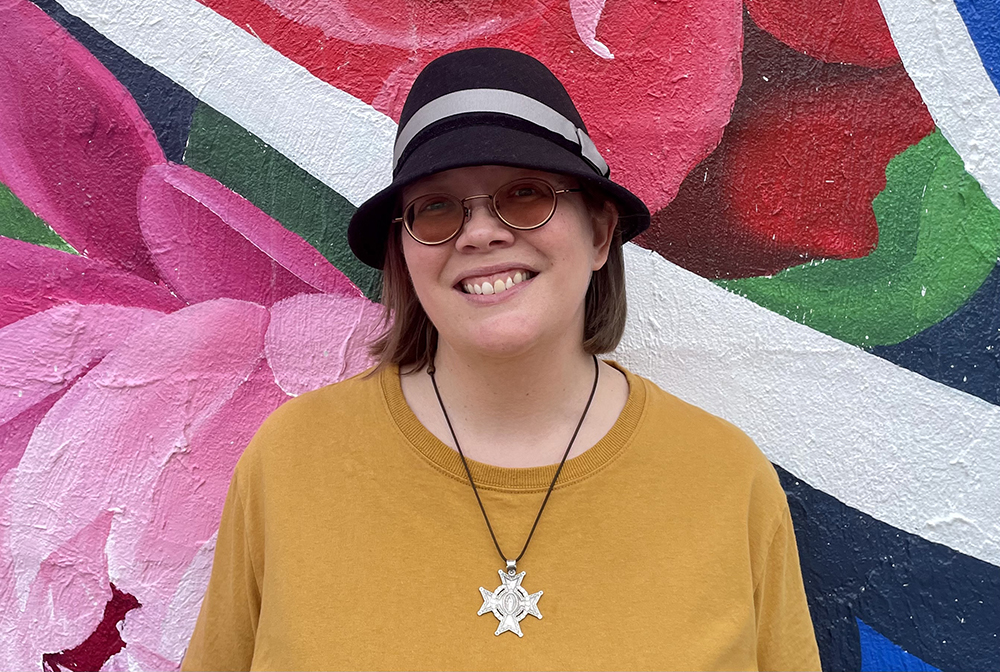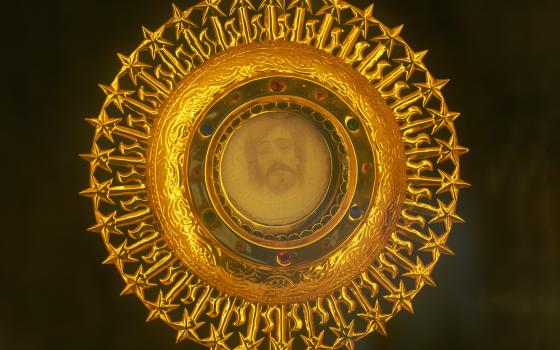
Sr. Julia Walsh, a member of the Franciscan Sisters of Perpetual Adoration, recounts her recovery from a life-threatening fall in her memoir For Love of the Broken Body. (Julia Walsh)
When Sr. Julia Walsh, a member of the Franciscan Sisters of Perpetual Adoration, ventured back to her family's Iowa farmland 17 years ago, the nostalgic hike nearly killed her. Tumbling off a 20-foot cliff, the then-25-year-old novice suffered injuries to her nose, jaw and hand, breaking "more (bones) than anyone could count," a nurse later told her.
Through it all, Walsh's faith fueled her to endure. She asked God for strength as she dragged her broken body back up the cliff and across pastureland. She prayed at the hospital, and requested a priest's anointing of the sick before reconstructive jaw surgery.
"I think a person can come to know their true character by observing how they respond in situations of crisis," said Walsh, 43, who serves as a writer and vocation minister in Chicago. "It became pretty obvious, this is who I am."
Walsh's faith has remained a cornerstone of her life since childhood, leading her to become a sister in her early 20s. But just like her lengthy recovery from the fall — involving months of physical therapy, treatment for post-traumatic stress disorder and sipping pureed meals through a wired-shut jaw — her foray into convent life involved a slew of doubts.

Newly released memoir For Love of the Broken Body traces the full trajectory of Sr. Julia Walsh's discernment process. (Courtesy of Monkfish Book Publishing Company)
Walsh details all of these experiences with unapologetic candor in her newly released spiritual memoir, For Love of the Broken Body, hailed as a nun's coming of age story.
"I was motivated to share a vocation story about my generation of sisters — a modern vocation story," said Walsh, who also hosts the podcast Messy Jesus Business and has written columns for Global Sisters Report. "It's (also) a story of trying to find meaning, purpose, belonging and establishing one's identity. I'm a broken person and incomplete, and yet I find wholeness in community."
Beyond recounting her life-threatening fall, Walsh's memoir also provides readers outside of religious communities with a rare primer on convent life and the discernment process.
Addressing common stereotypes and general lack of awareness about nuns, Walsh recounts the full trajectory of entering her community, from her introductory visit to St. Rose Convent in La Crosse, Wisconsin, to her associate phase, to her two years in the novitiate (or "nun boot camp" as she described to a friend), to professing her first and then final vows.
Every step of the way, Walsh never shies from detailing the deluge of doubts, questions and loneliness she experienced in adjusting to convent life. This includes various challenges for a 20-something living amongst older sisters, and the awkwardness of relinquishing common experiences of young adulthood, like dating.
Admitting in the book that she felt called to become a nun while praying about a crush, Walsh openly explores the tension of the call to celibacy. Her memoir recounts numerous life experiences and spiritual revelations that affected her indecision, demonstrating how personal and meaningful such spiritual discovery can be.
"I want to encourage more intergenerational conversations about the reality of religious life, and encourage us all to contemplate how we can continue to respond to the signs of the times and keep religious life alive," Walsh said.
Advertisement
Global Sisters Report: What audience did you have in mind with this book?
Walsh: I intended it to be for a very wide audience, even folks who are non-Christian, who are just curious about sisters and nuns but don't know the truth of what our life is like.
That's part of the reason that at the end of the book there's a glossary about religious life and Franciscanism and Catholicism, so anyone in the mainstream audience could pick up this book and gain something from it.
You mentioned in your book that long after your accident, you were still having issues with balance, tripping and PTSD. Does your accident still impact you today?
I still deal with the effects of the accident. In the past couple years, I've had root canals, and they can't say for sure, but the dentists acknowledge that my teeth were likely damaged in the accident. In addition, I still struggle with issues related to anxiety. I'm also dealing with an eye disorder now, and the eye doctors don't know if it's anatomy, or if it is related to the head trauma I endured.
I'm human and I'm broken, and I continue to explore how to give of myself while being a finite, broken person.
Why was it important for you to portray convent life and the process of entering your community in your memoir?
There are so many misunderstandings of what religious life is, how formation works and what the journey and the discernment process is like. I wanted to really show a behind-the-scenes look into a modern convent.
For those who aren't part of religious life, there's a lot that's mysterious about religious life. I think people like the life to be enclosed in mystery, but that's opposite of the point of what religious life is meant to be. This life is about gospel witness. My vows are public because they're for the people. People need to know what religious life is, and why people make this radical choice to give themselves to God and the church in this way.
"I'm human and I'm broken, and I continue to explore how to give of myself while being a finite, broken person."
— Sr. Julia Walsh
You're very frank throughout your memoir in discussing your struggles with celibacy, including developing strong romantic feelings as a novice for a former Franciscan postulant, and still experiencing crushes on men after taking your vows. Why did you want to bring this topic to the forefront in your book?
Our church could benefit from healthier discourse related to sexuality, and the realities of what it means to live as chaste people, no matter one's vocation. In a society that's incredibly oversexualized and fascinated with sex, and in a world where people are oftentimes trying to come to know the experience of being valued through sexual relationships, I'd rather we talk honestly.
I've found wholeness in a celibate community, and I've come to know Christ more intimately through that tension. I didn't want this book to really be about this, because it's so taboo and vulnerable, and something I'd rather keep private, but I feel it's important to move the conversation along because it's something we need to be talking about more.
Can you discuss how, as mentioned in your book, you ponder if celibacy is an act of feminism?
I recognize that some people are stripped of their freedom to make their own choices about what they do with their own bodies. I had the freedom and agency to decide how to love God with my body, and no one has coerced this from me. I believe I'm standing in my womanhood and giving my womanhood to God and the church.
In that way, my vow of celibacy could be an equalizing act. I pray that my "yes" to God's love allows for more equity and justice for others.
Your memoir also highlights the journey of your friend, the former Franciscan postulant, who left his community. Do you think many people face such struggles upon joining a religious order, or is this more common among younger generations?

Sr. Julia Walsh penned her memoir For Love of the Broken Body to portray a modern vocation story. (Julia Walsh)
I believe my friend did a good discernment and he's living the right lifestyle for himself now.
Many of us can only sort through the questions of whether we're called to profess our vows by entering and trying on the lifestyle. That's what a good formation and discernment process allows. It's not a failure when a person discerns to leave religious life. It's a discovery.
The reasons why some people are called to this unique lifestyle has to do with the movement of God in their life. I don't think that any authentic spiritual life could happen without real struggle, so struggles are appropriate.
Why do you think fewer young women are becoming sisters now, and what is the key to attracting more young women to this role and keeping them in it?
One reason is that there's less consciousness about the possibility. The more resources, events, programs, witness, online presence that sisters offer — or people in religious life in general can provide — the better it's going to be for people to even start to gain the courage to explore the question for themselves.
The receiving community also needs to do their work and be ready to adapt and change. Part of being a hospitable, inclusive space that people want to join means being ready to become something totally new and different.
What impact do you hope your book has on readers?
I mainly hope that every person who reads the book will come to know the sacredness of their brokenness. Everyone can show up and serve and stand in solidarity with others who are suffering, even if they themselves are feeling inadequate or broken. Brokenness can actually enhance how they're present to others.





